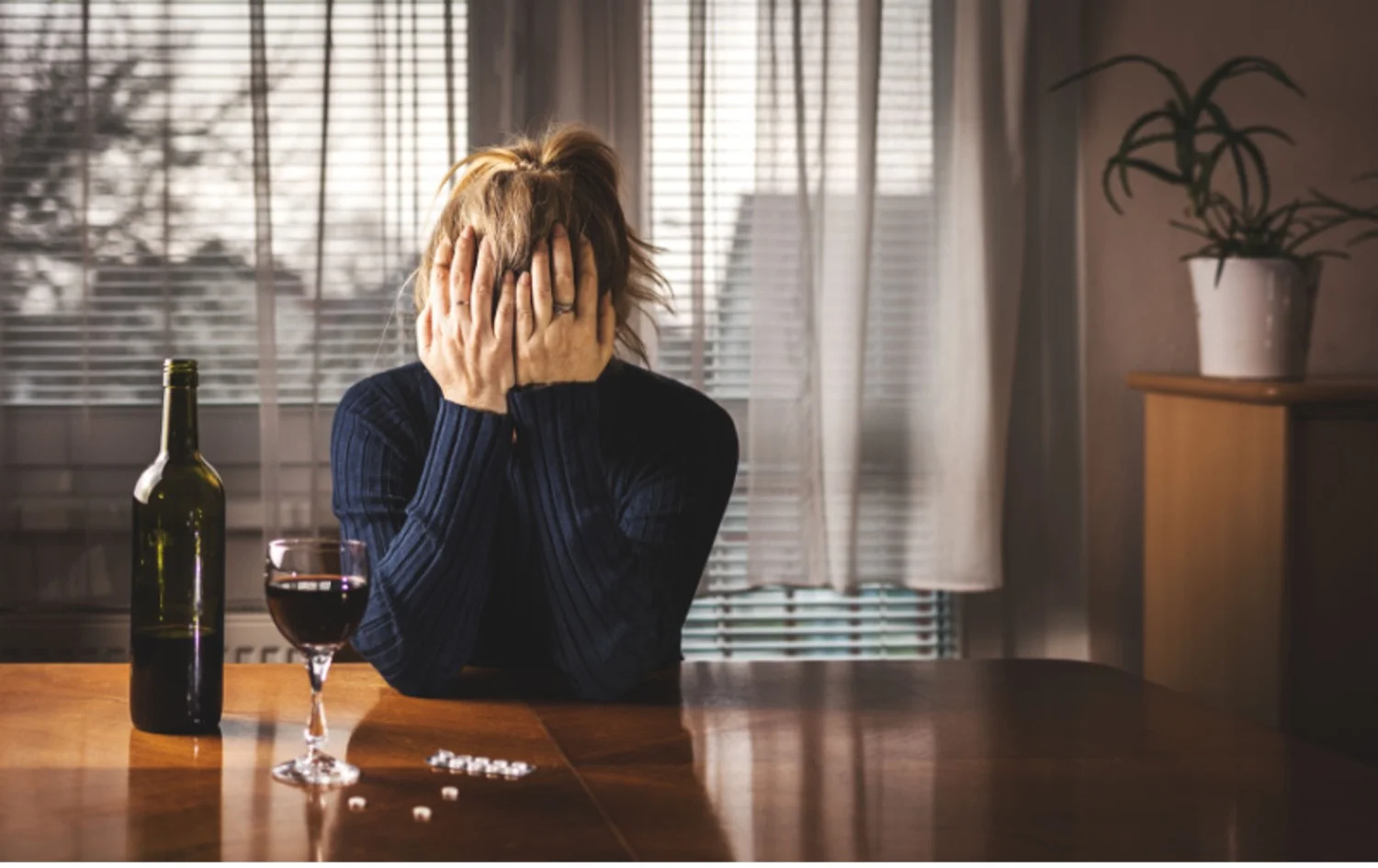Unraveling the Tangle: Navigating the Interplay of Anxiety and Addiction
Anxiety is one of the most common mental health conditions in the world. Unfortunately, anxiety is also a major motivating factor behind substance use, and substance use is a major contributing factor to anxiety.
“Anxiety can push people toward substances for a quick escape from stress or a false sense of control and relaxation,” says psychiatric mental health nurse practitioner (PMHNP) Valerie Puffenberger. “Additionally, individuals with anxiety may struggle with self-esteem and social interactions and use substances as a coping mechanism. The physiological effects of substances can temporarily alleviate anxiety symptoms, reinforcing their use.”
The combination of anxiety and addiction can cause severe negative effects. Luckily, a wide variety of treatment options for co-occurring addiction and anxiety can help patients lead healthier and happier lives.
Understanding Anxiety
Anxiety is both a feeling of fear, dread, and uneasiness and a term used to describe a group of mental health disorders in which abnormal or unhealthy levels of that feeling are present.
A number of factors can cause and influence anxiety, including:
- Genetics
- Life experiences and past trauma
- Substance use
- Hormonal changes
- Stress
- Brain chemistry
- Other medical or mental health conditions
Anxiety disorder takes a wide range of forms, but they all feature excessive levels of worry as well as behavioral and emotional disturbances.
Types of Anxiety Disorder
Below are some of the most common anxiety disorders:
- Generalized anxiety disorder: Involves persistent and excessive worry that interferes with daily activities and is often accompanied by physical symptoms.
- Panic disorder: Involves recurring panic attacks, which are episodes of overwhelming physical and psychological distress. Episodes can be severe enough to cause the victim to believe they are having a heart attack.
- Social anxiety disorder: Involves abnormally high levels of anxiety and discomfort in social situations, where one fears they could be embarrassed, humiliated, rejected, or looked down upon. Sufferers often avoid specific or sometimes any social situations as a result.
- Specific phobias: An intense and lasting fear of a specific person, place, thing, or activity that is out of proportion to the danger of the feared subject. Victims will often go to extreme lengths to avoid the thing they fear, and some victims are unable to leave their homes.
- Agoraphobia: An extreme and lasting fear of situations, such as being in a crowd or riding on an airplane, where escape is difficult or embarrassing.
- Separation anxiety: An excessive and persistent fear of separation from the people the victim is attached to. Symptoms usually begin in childhood but may persist into adulthood.
- Medication-induced anxiety disorder: Involves anxiety that is caused by a legal or illegal drug. The anxiety may either be a side effect of the drug or a symptom of withdrawal from the drug.
Symptoms of Anxiety

Every anxiety disorder is defined by a unique set of symptoms. However, there are some symptoms seen in many or most anxiety disorders, including:
- Persistent and uncontrollable worry; may be generalized or about a specific thing
- Feelings of restlessness and agitation
- Inability to relax
- Fatigue and/or low energy
- Irritability
- Mood swings
- Muscle tension, soreness, or stiffness
- Difficulty concentrating or focusing
- Difficulty sleeping
- Rapid heartbeat
- Shortness of breath
- Sweating
- Trembling
- Nausea
- Dizziness
- Chest tightness
- Avoidance of people, places, things, or activities that are the subject of the anxiety or phobia
- Panic attacks
- Obsessive thoughts and compulsions
- Fear of a specific person, place, thing, or activity
Anxiety Statistics
Anxiety is a common and treatable condition. If you feel like you’re the only person among your family and friends who deals with anxiety, chances are you’re wrong. Consider the following stats:
- Approximately 19% to 20% of American adults suffer from a diagnosable anxiety disorder in any given year, and approximately 30% to 40% suffer from one at some point in their lives.
- While anyone can develop an anxiety disorder, they are significantly more common among women, with approximately 23% to 24% of women and between 14% and 15% of men experiencing one in the past year.
- Approximately 3.1% of Americans experience generalized anxiety disorder, but only 43.2% of those affected are receiving treatment.
- Approximately 2.7% of Americans experience panic disorder, with twice as many women affected.
- Approximately 7.1% of Americans experience social anxiety disorder.
- Approximately 9.1% of Americans experience specific phobias.
Understanding Addiction
Addiction is a disease with both physical and mental health components and can revolve around substances and/or behaviors.
To have an addiction, an individual must:
- Have a fixation on a substance or a behavior.
- Experience cravings or urges for the substance/behavior that are relieved when they finally give in.
- Experience unpleasant withdrawal symptoms when they refrain from or reduce the substance/behavior.
- Experience repeated negative life consequences because of their substance use or behavior.
Addiction develops from biological and psychological processes in the body. Typically, an individual will use a substance or engage in a behavior that provides pleasure or relief. Over time, they develop a tolerance, which requires them to constantly increase their substance use or behavior.
Eventually, they find that if they do not use the substance/behavior, they experience withdrawal symptoms because the body can no longer function “normally” without the substance or behavior. One of these withdrawal symptoms is an urge to reengage with the addictive substance or behavior.
The desire to ease cravings and avoid withdrawal symptoms leads to greater and greater use of the substance or behavior. Eventually, many negative life experiences will likely result, including professional, personal, familial, financial, and legal impacts.
Anxiety and Addiction: How They Influence Each Other

Anxiety and addiction are very closely related. Studies have found that approximately 20% of individuals with an anxiety disorder also have a diagnosable substance use disorder.
Anxiety and addiction have what is referred to as a bidirectional relationship. That means that both anxiety and addiction can cause and worsen the other. In many cases, anxiety and addiction combine to form a downward spiral that traps victims into a cycle where both their addictions and their anxiety worsen, as do the negative impacts both have on their lives.
How Anxiety Fuels Addiction
Anxiety fuels addiction in a number of ways, including:
- Self-medication: Many anxiety sufferers use substances or behaviors to alleviate or eliminate their anxiety symptoms, at least in the short term.
- Escalating addictive behaviors: Anxiety symptoms may worsen cravings, withdrawal, or other symptoms of addiction, which motivates ever-growing levels of substance use/behavior.
- Forming cravings: The escalation of addictive behaviors caused by anxiety makes cravings stronger and more difficult to resist. Anxiety symptoms then make it even harder for victims to avoid giving in to increasingly strong cravings.
How Addiction Fuels Anxiety
Addiction fuels anxiety in a number of ways, including:
- Substance-induced anxiety: Many drugs, including alcohol, can cause anxiety symptoms. Substance-induced anxiety can compound existing anxiety disorder symptoms, creating a severe anxious state.
- Withdrawal symptoms: Anxiety is a withdrawal symptom for most substances and some behaviors. If the addictive substance/behavior was suppressing anxiety, there may also be rebound anxiety, which is the return of anxiety disorder symptoms. Rebound anxiety is often more severe compared to the anxiety experienced before substance misuse.
- Consequences of addictive behaviors: Many addictive behaviors can cause severe negative impacts on the professional, personal, familial, financial, and legal aspects of victims’ lives, which in turn can cause significant levels of anxiety.
Common Treatment Approaches for Anxiety and Addiction
Every addiction is unique, as is every case of an anxiety disorder. That means each one will need to be treated in a unique way determined by the individual patient’s needs.
However, the most effective treatment approaches for anxiety and addiction combine:
- Medications that alleviate or reduce symptoms of anxiety and withdrawal.
- Therapies that help patients get to the root causes of both anxiety and addiction so they can modify their behavior for the long term.
Psychotherapy

Psychotherapy is one of the most effective methods of treating both anxiety and addiction, especially when they are co-occurring. Some of the most common forms of psychotherapy for anxiety and addiction treatment include:
- Cognitive behavioral therapy (CBT): The goal of CBT is to help patients identify and understand negative thought and behavioral patterns and then use this knowledge to change their behavior. This process can alleviate anxiety symptoms, help manage cravings, improve overall emotional well-being, and more.
- Exposure therapy: Exposure therapy is a technique that gradually exposes individuals to the source of their fear or anxiety in a controlled and safe manner. The goal of exposure therapy is to reduce anxiety levels and possibly eliminate them altogether. Exposure therapy can also be modified to treat addiction by slowly exposing victims to triggers until they can cope in a healthy manner.
Dual Diagnosis Programs
Dual diagnosis programs are designed to treat co-occurring mental health and substance use disorders. Dual diagnosis programs combine medications and clinical therapies to help patients get through withdrawal and the anxiety that comes with it. They help patients uncover the root causes of their addiction and anxiety and overcome both disorders at the same time.
Some of the most common forms of dual diagnosis programs include:
- Inpatient dual diagnosis programs: Inpatient programs require patients to live at a facility where they receive around-the-clock medical and clinical care. Inpatient rehab is generally more expensive than outpatient rehab and requires greater life sacrifices. But it completely separates patients from the negative influences in their lives and provides the greatest likelihood of lasting recovery from addiction and anxiety.
- Outpatient dual diagnosis programs: Outpatient rehab requires patients to attend treatment sessions several days a week while living elsewhere. Outpatient rehab provides a lower likelihood of success because it does not fully separate patients from their lives, but it is generally less expensive and allows patients greater flexibility to continue meeting life obligations.
Alternative Treatment Options: Psychedelics for Anxiety, Addiction, and Depression
A substantial amount of research effort and funding is geared toward improving the treatment of both anxiety and addiction. New treatment methods, techniques, and medications are constantly being tested and released.
Some alternative treatment options for anxiety and addiction that are growing in mainstream acceptance include:
- Psilocybin: The active compound in “magic” mushrooms has shown promise in treating anxiety and depression. It has also shown some potential to help individuals confront underlying emotional issues in therapeutic settings.
- MDMA: The chemical better known as ecstasy or molly has shown potential for treating post-traumatic stress disorder and other trauma-related conditions, including certain forms of anxiety. MDMA treatment requires therapeutic supervision.
- Ketamine: A dissociative anesthetic, ketamine has shown rapid anti-depression effects, especially in cases of severe and treatment-resistant depression. However, these effects are generally shorter-lasting than many alternatives and need more exploration.
Living in Recovery for Anxiety and Addiction
There are thousands of techniques and strategies that those in addiction and anxiety recovery can use to prevent relapse. Puffenberger recommends the following:
- Develop a strong support system, including therapists, support groups, and understanding loved ones.
- Learn healthy coping mechanisms for anxiety, such as deep breathing exercises, mindfulness, and engaging in relaxation activities.
- Develop healthy lifestyle habits, such as regular exercise, adequate sleep, and a balanced diet.
- Identify and avoid triggers.
- Establish a routine.
- Set realistic goals.
Break the Cycle of Anxiety and Addiction
If you or a loved one is suffering from anxiety and addiction, it may seem as if there is no escape, that nothing will ever be right again. However, nothing could be further from the truth. There are thousands of dedicated professionals waiting to help you start living a life free from anxiety and addiction, including those at Legacy Healing Center.
We treat anxiety and addiction with a three-pronged approach that focuses on:
- The right psychotropic medications
- Evidence-based psychotherapy
- Peer support
We’re here to help you or your loved one overcome anxiety and addiction. Call 888-534-2295 today to speak with a staff member.
Anxiety and Addiction FAQs
What is the relationship between anxiety and addiction?
Anxiety and addiction have a bidirectional relationship. This means that anxiety and addiction can both cause the other, and they can worsen each other. Anxiety and addiction often cause victims to fall into a downward spiral, where greater substance use causes greater anxiety, which motivates greater substance use. To treat a patient who suffers from both anxiety and addiction, you will typically need to treat both at the same time.
Can anxiety lead to addiction, or vice versa?
Yes. Anxiety can lead to addiction and can worsen an addiction that already exists. Similarly, addiction can lead to anxiety and worsen an anxiety disorder that already exists. This forms what is known as a bidirectional relationship.
How are anxiety and addiction commonly treated?
Anxiety and addiction are commonly treated with a combination of medicines and clinical therapy. The goal of medication is to alleviate or eliminate anxiety disorder and withdrawal symptoms. The goal of clinical therapy is for patients to identify the underlying causes of their addiction and anxiety and then modify their behavior.
Some of the most effective treatments for anxiety and addiction include cognitive behavioral and exposure therapies and inpatient and outpatient dual diagnosis rehab programs.
Are there alternative treatments, such as psychedelics, for anxiety, addiction, and depression?
There are a number of alternative treatments for anxiety, addiction, and depression. Some of these alternative addiction and anxiety treatments that are becoming increasingly accepted are psychedelics, including psilocybin, MDMA, and ketamine.
What options are available for anxiety and addiction recovery?
If you would like to know more about what treatment options are available for anxiety and addiction, call 888-534-2295 today to speak with a staff member at Legacy Healing Center. We would love to help you on the path to recovery.
Sources
- American Psychiatric Association. (2023). What Are Anxiety Disorders?
- Anxiety & Depression Association of America. (n.d.). Anxiety Disorders – Facts and Statistics.
- National Institute of Mental Health. (2023). Anxiety Disorders.
- Medical News Today. (n.d.). What to Know About Anxiety.






